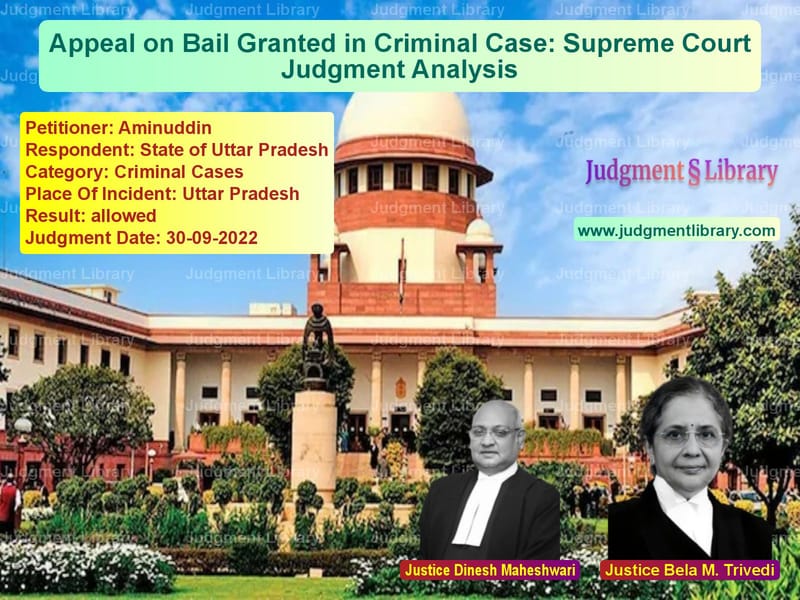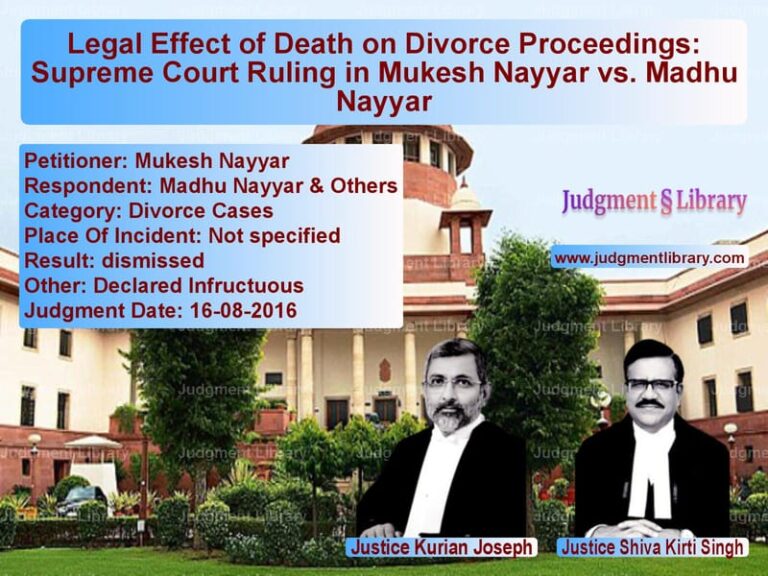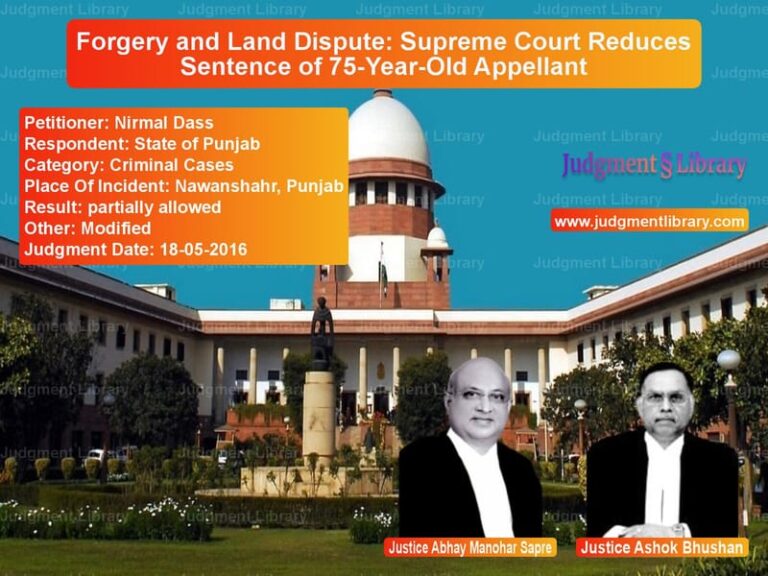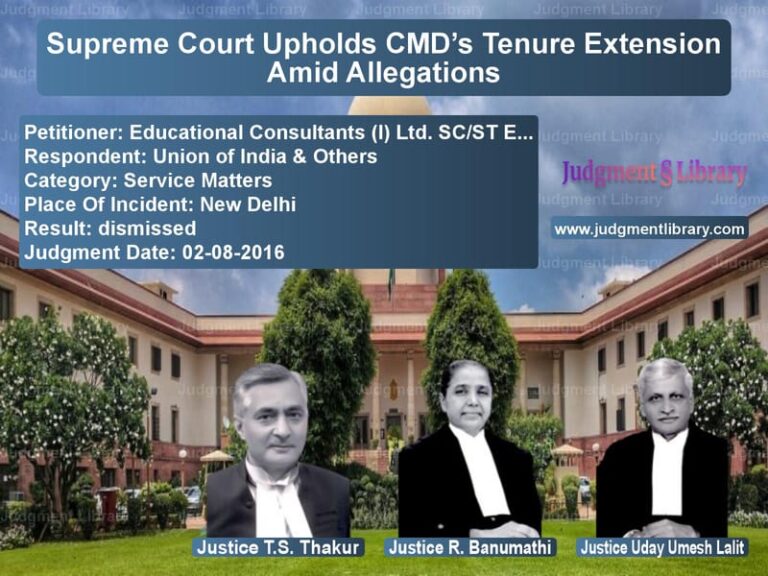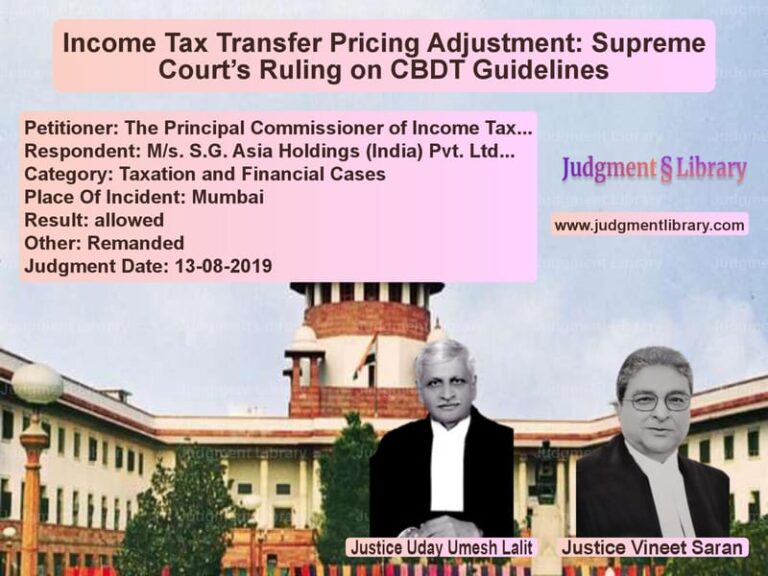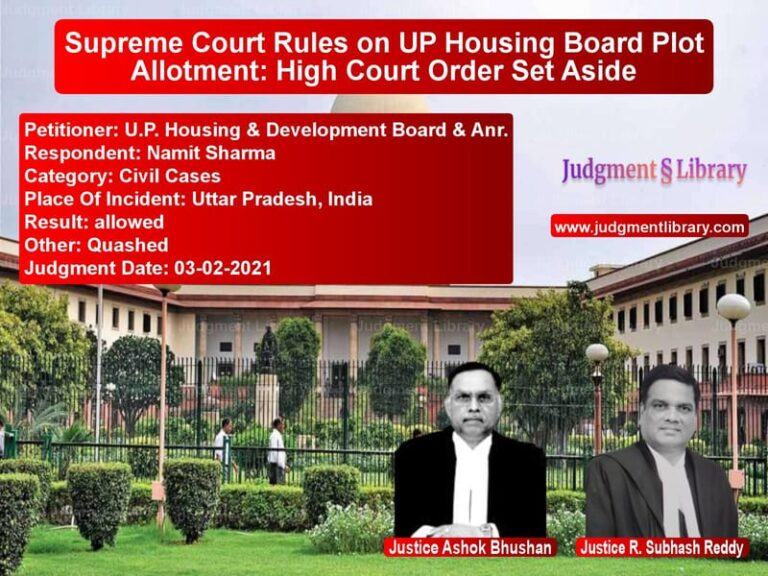Appeal on Bail Granted in Criminal Case: Supreme Court Judgment Analysis
The case presented to the Supreme Court involves two appeals arising from Special Leave Petitions (SLP) in Criminal Appeals from Uttar Pradesh. The petitioners, Aminuddin, challenged orders from the Allahabad High Court granting bail to accused individuals, which the petitioners argued were made without proper consideration of critical case facts. The Court ultimately decided to intervene and overturn the High Court’s decisions, emphasizing the importance of a reasoned judicial approach in granting bail.
The core issue revolved around the orders made by the High Court on August 26, 2020, and June 17, 2020. The High Court had granted bail to the respondents, primarily based on the premise of parity, i.e., the same relief granted to other co-accused. This reasoning was not found satisfactory by the Supreme Court, which highlighted that the High Court had failed to consider all relevant aspects of the case.
In the judgment, Justice Dinesh Maheshwari of the Supreme Court carefully examined the case, the arguments of both sides, and previous decisions. He underlined that the High Court had made the decisions without sufficiently weighing critical facts, such as the seriousness of the crime and the implications of granting bail to those involved in a potentially brutal murder.
Petitioner’s Arguments
The petitioner’s counsel argued that the accused respondents, who had been in custody for extended periods, were granted bail based on irrelevant factors, such as the bail given to co-accused persons in similar situations. The petitioner highlighted that the nature of the crime, which involved a brutal daylight murder, should have been a decisive factor in the denial of bail.
Further, the petitioner pointed out the High Court’s failure to give sufficient reasons for its decision, a flaw that the Supreme Court has repeatedly emphasized as necessary for ensuring transparency and fairness in bail proceedings. The petitioner contended that the orders were passed solely in a manner that lacked detailed judicial reasoning, thus failing to meet the requirements set forth by the Supreme Court in previous judgments.
Respondent’s Arguments
The respondent’s counsel sought to distinguish the case of their client by pointing out that the accused had been in custody for a longer period than some of the co-accused. They further argued that the High Court’s decision to grant bail was grounded in the broader constitutional principle of personal liberty under Article 21, and the fact that stringent bail conditions had been imposed. Additionally, the counsel for the respondent stated that none of the bail conditions had been violated, and therefore, the bail granted should stand.
The defense also sought to argue that the lack of specification of the respondent’s role in the offense could provide a justification for bail. They claimed that the case against the respondent lacked sufficient specific evidence to warrant continued detention, and thus, the bail order should not be overturned.
Read also: https://judgmentlibrary.com/supreme-court-upholds-murder-conviction-in-puducherry-case/
Judicial Reasoning
The Supreme Court, in its judgment, scrutinized both the High Court’s reasoning and the submissions made by both parties. The Court emphasized that the High Court had granted bail primarily based on the bail granted to co-accused without appropriately considering the distinct and serious nature of the crime. The Court noted that the granting of bail should not be done in a mechanical manner but must be based on a comprehensive evaluation of the facts, including the seriousness of the alleged offense.
Justice Maheshwari pointed out that the High Court had failed to demonstrate that it had adequately considered the significant features of the case, such as the brutal nature of the crime and the role of the accused. He referenced previous judgments that stressed the importance of giving detailed reasons for bail orders to ensure transparency and judicial accountability.
Precedent and Consistency
The Court also considered earlier rulings in similar cases, particularly the decision in Criminal Appeal No. 317 of 2021, where the Court had disapproved of bail granted to a co-accused in a similar case of murder. The Court made it clear that the bail granted to the present respondents was based on a flawed application of the principle of parity, which had already been disapproved in earlier rulings.
Furthermore, the Court stressed the need for consistency in applying legal principles, particularly when dealing with serious offenses. It was pointed out that the respondents’ release on bail, based solely on the orders for co-accused, undermined the seriousness of the offense, as it involved a brutal murder.
Read also: https://judgmentlibrary.com/bail-in-murder-case-a-legal-analysis-of-the-aminuddin-case/
Conclusion
In conclusion, the Supreme Court allowed the appeal, setting aside the High Court’s bail orders. The Court required the accused respondents to surrender forthwith and indicated that they could reapply for bail at a later stage based on the merits of the case. The Court also emphasized that none of the observations made during the judgment should affect the final outcome of the trial, preserving the principle of open justice and ensuring that the merits of the case are decided based on a fair trial.
The Court’s ruling reaffirmed the importance of judicial scrutiny and the need for transparent, reasoned decisions in cases involving serious criminal offenses. It also underscored the need to maintain balance between personal liberty and the protection of society through the judicial process.
Petitioner Name: Aminuddin.Respondent Name: State of Uttar Pradesh.Judgment By: Justice Dinesh Maheshwari, Justice Bela M. Trivedi.Place Of Incident: Uttar Pradesh.Judgment Date: 30-09-2022.
Don’t miss out on the full details! Download the complete judgment in PDF format below and gain valuable insights instantly!
Download Judgment: aminuddin-vs-state-of-uttar-prade-supreme-court-of-india-judgment-dated-30-09-2022.pdf
Directly Download Judgment: Directly download this Judgment
See all petitions in Bail and Anticipatory Bail
See all petitions in Murder Cases
See all petitions in Custodial Deaths and Police Misconduct
See all petitions in Fraud and Forgery
See all petitions in Judgment by Dinesh Maheshwari
See all petitions in Judgment by Bela M. Trivedi
See all petitions in allowed
See all petitions in supreme court of India judgments September 2022
See all petitions in 2022 judgments
See all posts in Criminal Cases Category
See all allowed petitions in Criminal Cases Category
See all Dismissed petitions in Criminal Cases Category
See all partially allowed petitions in Criminal Cases Category

